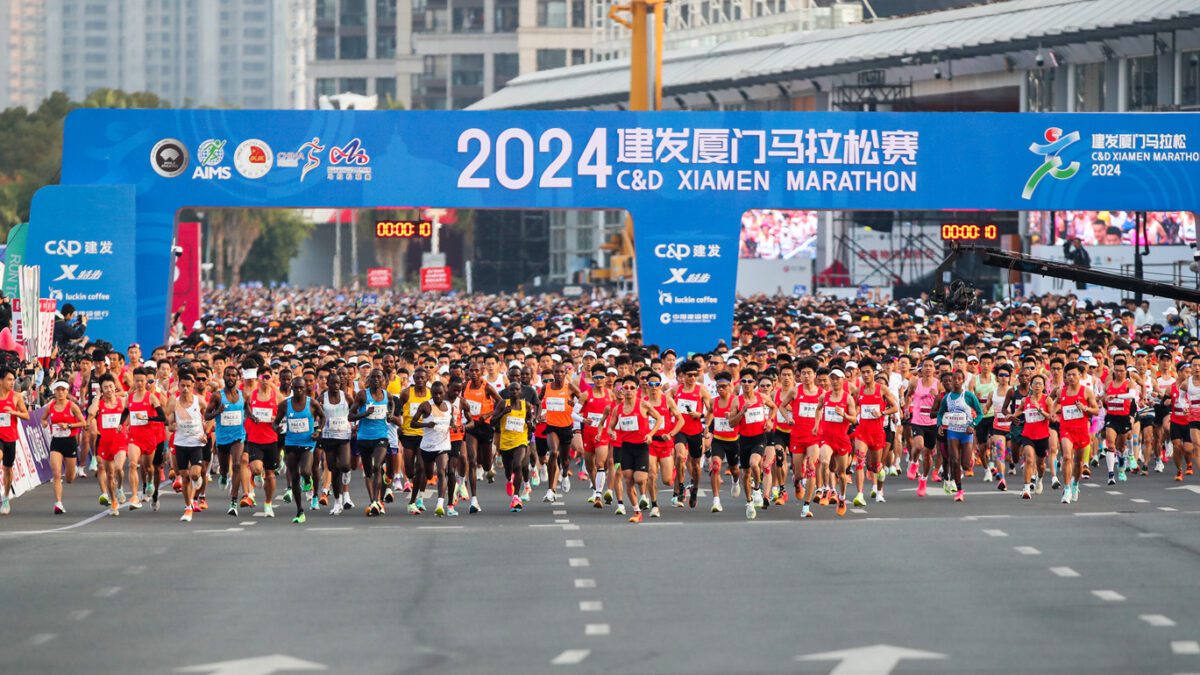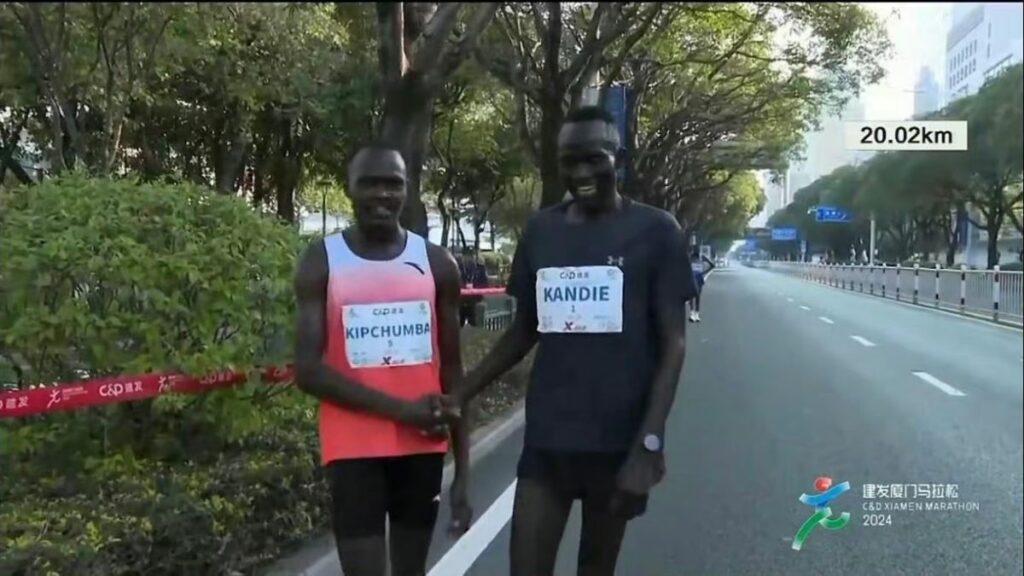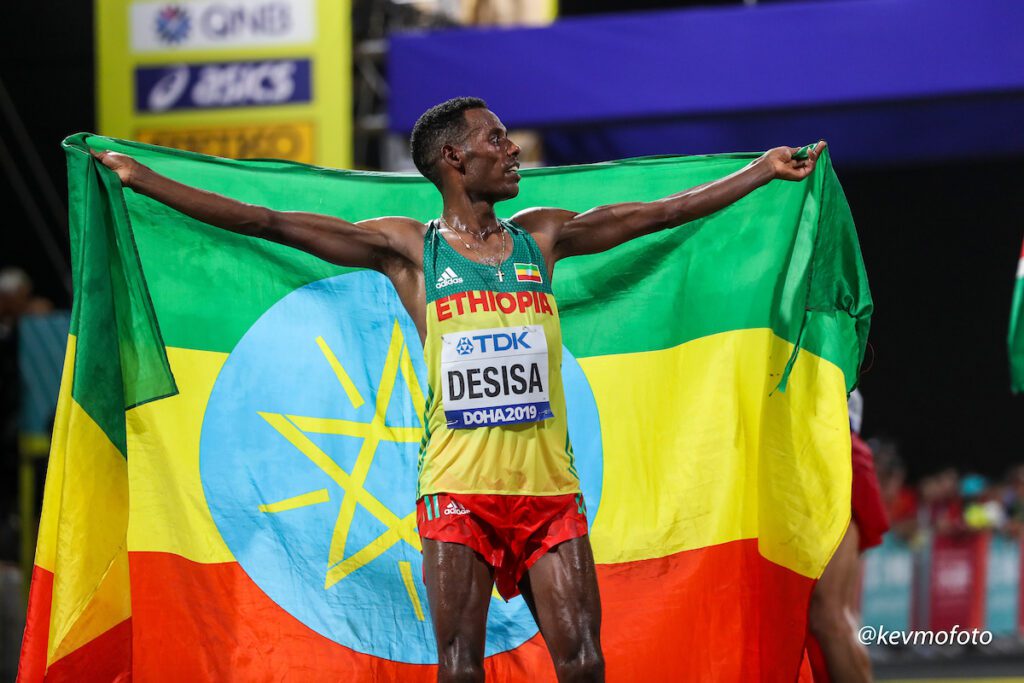Does World Athletics have an elite-label marathon problem?
The 2024 Xiamen Marathon in China invited 22 elite international athletes, which was dubbed "the fastest marathon pack ever assembled," but only seven of them finished
 Photo by:
Xiamen Marathon/Facebook
Photo by:
Xiamen Marathon/Facebook
The Xiamen Marathon in China on Jan. 6 marked the first World Athletics Platinum Label Road Race of 2024. The field was loaded, attracting the former half-marathon world record holder, Kenya’s Kibiwott Kandie, and the 2022 world marathon champion from Ethiopia, Gotytom Gebreslase. But as good as the field was, it did not live up to the hype, as neither athlete finished the race. Both were later called out by Chinese media for “collecting appearance fees,” igniting a broader issue facing World Athletics Label races.
Organizers of the Xiamen Marathon invited Kandie, defending champion Philimon Kipchumba and Gebreslase to headline the elite field, aiming to draw more attention to marathon events in China with some of the sport’s most popular stars. It did not work out, with Kandie and Kipchumba withdrawing from the marathon immediately after crossing the 20K mark, raising eyebrows from locals as they posed for photos, shook hands and smiled for photos.

It became worse when it was revealed that Kandie only had to complete 20 kilometres to collect his appearance fee. This would potentially violate World Athletics Competition Rule article 4.1: “An intentional arrangement, act or omission aimed at an improper alteration of a result or the course of an event or competition in order to remove all or part of the unpredictable nature of the event or competition to obtain an undue benefit for oneself or others is a violation.” The photo of Kandie and Kipchumba smiling and shaking hands at the 20K mark of the Xiamen Marathon challenges that rule. It raises questions about whether this was their plan all along.
A representative from World Athletics told Canadian Running that Platinum and Gold Label races require a minimum number of athletes with gold or platinum status at the start line of an event. The 2024 Xiamen Marathon had 16 gold-level and six platinum-level athletes. Fifteen of the 22 elite-label athletes did not finish the race, with five platinum-level athletes (Kandie, Chalu Deso, Mergertu Alemu, Ruti Aga and Gebreslase) either not starting, or not finishing.
— Daan van den Berg (@BergvdD) January 11, 2024
In the days before the race, World Athletics released a race preview entitled, “The fastest marathon pack ever assembled.” None of the athletes featured in the preview finished the race. When asked about the pressing issue of elite-level talent being accused of collecting appearance fees, World Athletics said: “As I am sure you understand, whether due to injury, personal reasons or other, we are never able to predict with certainty who will start or finish a race, come event time.”
The 2024 Xiamen Marathon raised broader questions about the effectiveness of appearance fee structures, especially in World Athletics Platinum and Gold Label races. Elite athletes with marathon personal bests around 2:22 (for women) or 2:07 (for men) are typically offered substantial appearance fees ranging from USD$10,000 to $15,000 to participate in races held in the Middle East, India and China, according to marathon agent Volker Wagner.
When asked if World Athletics thought the appearance money would be better spent on athletes who intend to run the full distance or who may be chasing Olympic qualification, they said: “Appearance fees are an important aspect of our sport, and many others–including tennis and golf.”
Although athletics and the pro tennis structure share similarities, they also have one major difference. A tennis player who is paid an appearance fee to play a tournament, or a match, will finish the match, unlike in elite marathoning. The 2024 Mumbai Marathon in India on Jan. 21 presented another example of high-performance athletes seeming to collect appearance fees without providing strong performances. The once-great Lelisa Desisa of Ethiopia headlined the Gold-Label men’s field, and two-time Amsterdam Marathon champion Tadelach Bekele of Ethiopia headlined the women’s field. Both athletes started the race, but fell off the lead pack and dropped out. Desisa has now failed to finish his last seven marathons (his last finish was at the 2020 Valencia Marathon, where he finished 35th, after winning the 2019 World Championships marathon in Doha, Qatar). It’s a similar story for Bekele, who DNF’d at all three marathons she started in 2023, plus now the Mumbai Marathon, making it four straight.

World Athletics says they are always looking to expand the sport, that they are “making great efforts” to ensure the sport is successful in China and India and that athletes receive attractive prize money for their appearances and performances. The Xiamen Marathon is the first World Athletics Platinium-Label race in China, and it headlines a massive running community with more than 580 official road races each year and several thousand, often tens of thousands, participants taking part.
While World Athletics has denied any wrongdoing in Xiamen, stating the difficulty in predicting athlete participation, the controversy has prompted discussions about improving event rules and processes. One North American race director compared these elite-label Chinese races to the Saudi Pro (Soccer) League. “No athlete really wants to go there, so they generally offer silly money. And these top-level events are often backed by the Chinese government,” he said.
The race director went on to reveal that the pandemic changed how much European and North American marathons can offer athletes. Although winning Rotterdam, Houston, or Paris may bring high rewards and sponsorship opportunities, the money offered in China, India, or the Middle East is guaranteed.
Lelisa Desisa is ready to conquer the tracks of Mumbai 💯
A former World Champion, he will be eager to add a new one to his already decorated library of accolades 🥇#TMM2024 #HarDilMumbai pic.twitter.com/wOS8F5UZHq
— Tata Mumbai Marathon (@TataMumMarathon) January 7, 2024
World Athletics has consistently pursued a marketing strategy aimed at boosting viewership in China and India, with the belief being that the presence of renowned athletes and remarkable performances can significantly enhance engagement for those races. While recognizing that every race may not yield record-setting times, wouldn’t it be more compelling to have athletes striving to achieve national records or Olympic standards, thereby elevating the stature of these smaller athletes and the race on a broader scale?


